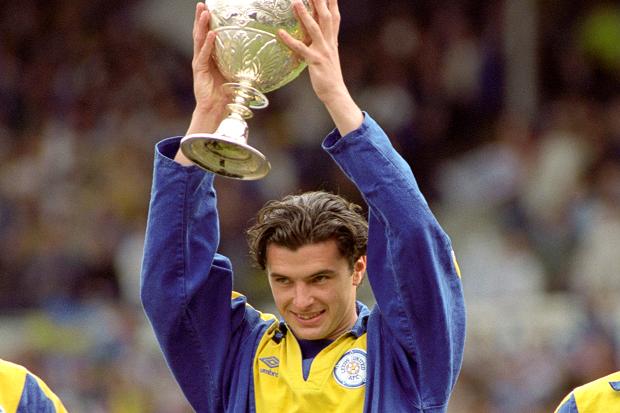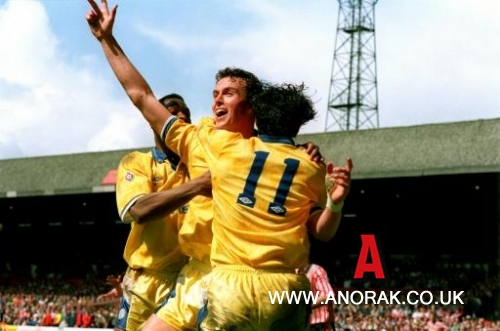Gary Speed: Feeding Speculation And Waiting For The Secrets We Have No Right To Hear
 GARY Speed’s death is occupying minds at the Sun. The paper’s front-page headline says of the man who represented Leeds United, Newcastle United, Everton, Sheffield United And Bolton Wanderers:
GARY Speed’s death is occupying minds at the Sun. The paper’s front-page headline says of the man who represented Leeds United, Newcastle United, Everton, Sheffield United And Bolton Wanderers:
“Gary didn’t argue with wife, he wasn’t depressed”.
We do not know why Gary Speed died. The manager of the Welsh football team was found hanged in the garage at his home near Chester. An inquest will be opened at the coroner’s court at Warrington Town Hall on Tuesday.
We may never know why he died. But do we need to know? Do we deserve to know?
Some of the people who knew him have been speaking to the media that employs them. Alan Shearer is on the Sun’s back page:
“The question I keep asking myself and have done since I heard the dreadful news is ‘Why? Why Speedo, didn’t you give me or one of your other close mates a ring, if you were feeling so bad?’ Why he couldn’t have picked up the phone for a chat in those moments before he did what he did, I’ll never know. None of us will. I was with him on Saturday watching the Stoke game and arranging next weekend.”
To his friends, Speed’s suicide is inexplicable. But to the rest of us it’s just a sad story. We want to know why because we’re nosy and curious and want to understand. But the Sun’s front-page headline begs a question: how do you report on Gary Speed’s death?
In mentioning Speed’s wife, Louis, and featuring her face, the Sun continues the work of the Daily Mail, which yesterday also led with a photo of Louise Speed.
Over page 4, the Sun again focuses on the widow:
Gary & Louise were happily married…she just doesn’t understand it
The Times reports:
The mystery surrounding Gary Speed’s death deepened today after his best man denied rumours of marital difficulties.
Hayden Evans, Speed’s agent and best man at his wedding, tells the Sun:
“They were happily married and anyone who knows them will tell you that. This is why it’s a mystery. We genuinely at the moment have no clue whatsoever what has caused it and I have been with the family all day. Everybody is asking the same question and no one has an answer. We are all in shock.”
So. Speed suffered from depression?
“None whatsoever. The one thing the family and me as one of his closest friends would totally refute is that. There was no indication of any problems and never has been.”
Doesn’t this just stir the story pot, turning one man’s death into something armchair detectives can try to fathom out and speculate on? The tabloids are doing their job well. The paper’s role is to inform and entertain the readers. They need to appeal to football fans, for whom Speed was a man they can relate to. Leeds United fan Rick Broadbent puts it well when he writes in the Times:
Like any fan with favourites, I felt a closeness with that midfield that has remained long after they had departed. I did not know Gary Speed, but I did not let that get in the way of our friendship.
The paper also needs to appeal to the readers who just like a sad story or a decent yarn. So. It dallies on any speculation it can find.
In the Sun, Alan Shearer adds:
“No one had a bad word for him. He was what you’d describe as a proper bloke, a proper man. You could depend on him.”
But with speculation comes accusation and rumour.
David Aaronovitch notes:
The only rumours about the cause of his apparent suicide have been online speculations that, variously, The Sun or the Daily Starwere preparing some kind of story about his private life (the authors then speculate about what this was), and that it was tabloid intrusion that had killed him. Both papers have denied any such thing and I believe both denials.
I partly believe them because I don’t think any newspaper in possession of its senses would dare run a story like that on a popular figure right now, mid-Leveson, just as none of them dares to speculate in print about Speed’s death. But this, of course, won’t stop people speculating online — they just offset the sin by projecting it on to the villainous tabloids.
Give it time. We wonder how it will be before a paper invites us to read about Speed’s secret life and to speculate on why he did it?
The media is tapping on the Speeds’ front door. Will Louise Speed feel a need to speak with them and offer an insight into her husband’s death? How the media must hope she follows the tale of Robert Enke, the German goalkeeper who committed suicide when he stepped in front of a rushing train. The player’s widow, Teresa Enke, helped Roland Reng write a book about her husband called A Life Too Short. She gave insight into her husband’s depression. The book has just been named William Hill Sports Book of the Year.
Said Reng as he accepted his award:
“I wrote this book so that something of Robert Enke will remain. I hope it will tell people what a nice person he was, and what a terrible illness depression is. You can’t fight it in the way you might fight cancer. You are left alone and can’t do anything about it.”
It’s a brave and brilliant book. It is not Gary Speed’s book. Will his be written?
Evans reads a statement from Gary Speed’s family:
“Gary’s family would sincerely like to thank all the people that have sent messages of condolence and tributes in what is a very difficult time. We have been overwhelmed by the support and it really has helped. We would ask that the family are given the respect of some privacy to just grieve on their own.”
In light of the ongoing Leveson Inquiry into media standards, will the media back off? And would we prefer it that they did..?
Posted: 29th, November 2011 | In: Key Posts, Sports 6 Comments | TrackBack | Permalink



